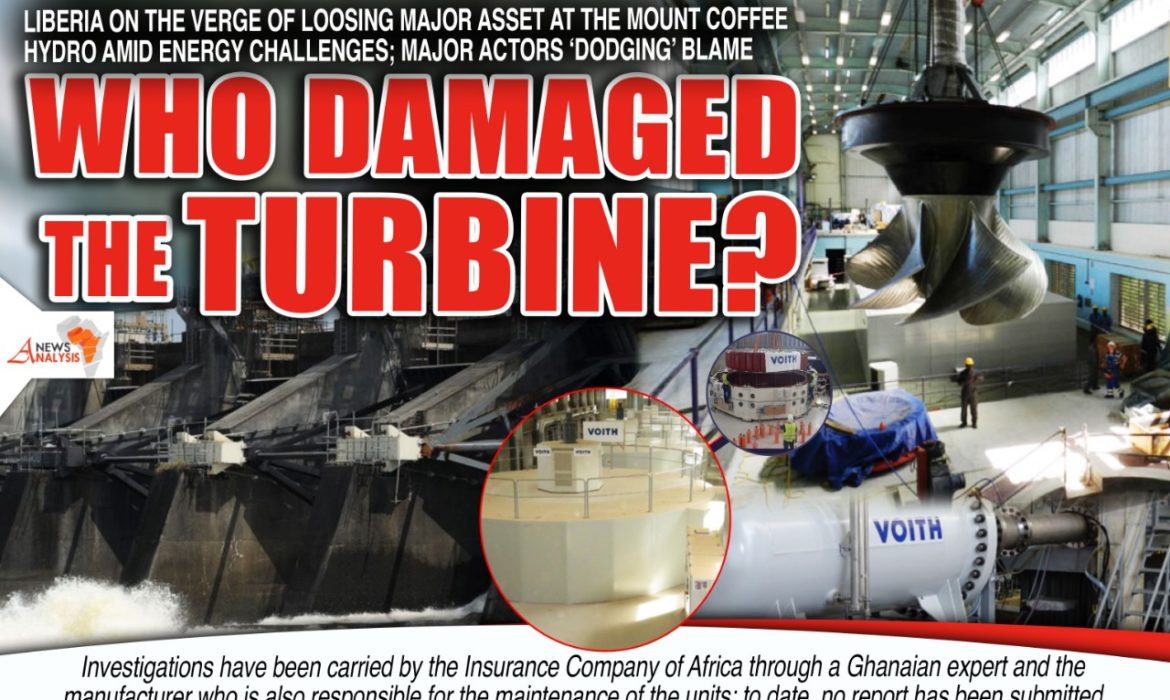MONROVIA – Two of the four turbines at the Mount Coffee Hydro have been down and the Government of Liberia is yet to know what led to the damage, despite series of investigations commissioned by the manufacturer and the insurance company.
FrontPageAfrica gathered from sources familiar with the development within the Liberia Electricity Corporation (LEC) that while one of the turbines was shut down due to oil leakage, the other got burnt in February, thereby, reducing the capacity of the hydro from 88 megawatts to 44 megawatts.
It is believed that the second turbine got damaged when LEC recalibrated the turbine to function at a low water level – something that led to it burning.
VOITH, the German company that manufactured the turbines and has a maintenance contract with the government of Liberia has reportedly refused to take responsibility after its investigation established that the damage was caused by the recklessness of the Liberia Electricity Corporation.
While the cost of the turbine is not been clearly stated, FrontPageAfrica gathered that each of the four units is ¼ of the construction cost which is estimated at about US$75 million.
FrontPageAfrica gathered that as Voith refuses to take responsibility for the damage, LEC insurance company – Insurance Company of Africa (ICA) which also brought in an expert from Ghana to do conduct an independent investigation has also refused to take responsibility.
This means the Liberia Electricity Corporation must on its own repair or replace the damaged turbine.
As a result of the reduction of the power generated, the LEC, according to a source, recently imported heavy fuel oil to run thermal plants along with the hydro.
FrontPageAfrica further gathered that it is due to the reduction in the power generated by the hydro that most of the streets lights around town are no longer lit.
“It is because of the LEC wanted to buy the HFO, that’s why it recently announced a 30% pay cut of its employees and blaming the cuts on low-income generation due to power theft,” the source disclosed.
The source added, “Those who are responsible for the damage of the turbine must be held responsible. This is a major government asset. One of the largest and important assets of the government and it seems everybody is playing innocent here to the detriment of the entire country.”
The Chief Executive Officer of LEC, Mr. Pascal Buckley did not respond to FrontPageAferica’s request for comments.
In May 2012, the Mt. Coffee Hydropower Rehabilitation Project was initiated with a series of surveying and engineering assessments of the feasibility of revitalizing the plant. This work culminated with the signing of a contract in April 2013 with a Norwegian company (Norplan AS) and a German company (Fichtner GmbH) to revitalize the defunct power plant by 2015.
In December 2016, the first hydropower turbine and generator unit, with an installed capacity of 22 megawatts (MW), was officially dedicated and commissioned. The project, completed in 2018, raised the total installed capacity of the Mt. Coffee Hydropower Plant to 88 MW (four generating units of 22 MW each).
Once considered a symbol of prosperity, the Mount Coffee Hydro rehabilitation was declared goal of Liberia’s government to lift its people out of darkness and accelerate the country’s economic growth.
The costs for the whole rehabilitation process were estimated at about $230 million. For the realization of this goal an ambitious plan was set in 2011 including a consortium of donors, such as the European Investment Bank (EIB), the German Development Bank (KfW) and the Government of Norway. Agreements were signed, in which the EIB gave a loan in the amount of €50 million, the Government of Norway with an amount of approx. €40 million and the German Development Bank for a grant of €25 million. The Government of Liberia committed to contribute $45 million. The U.S., represented by the Millennium Challenges Corporation (MCC), joined in as a funder in 2015 as part of bilateral compact with Liberia that comprises $257 million.
Source: frontpageafricaonline.com

